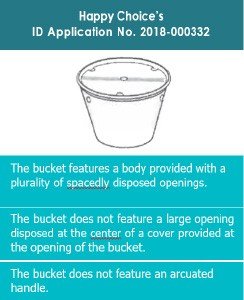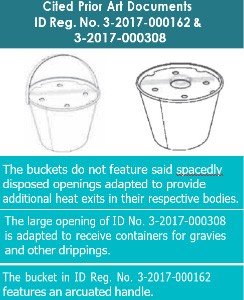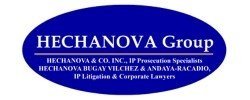Third-party observations in industrial designs
17 January 2022

The Philippines adopts an expeditious registration process for industrial designs. No substantive examination is conducted, and a certificate of design registration is issued, provided all formal requirements are complied with and the fees are paid. There is no pre-grant nor post grant opposition for patents, utility models and industrial designs, unlike in many other jurisdictions.
The recourse was to file a petition for cancellation once the design registration is granted. However, to ensure the quality of granted industrial designs, and for the purpose of transparency, and to provide a cheaper way by which oppositions are ventilated, the Implementing Rules and Regulations for Patents, Utility Models and Industrial Designs (IRR, issued in 2011) lay down a pre-grant opposition mechanism by way of community review and the submission of adverse information, from any third party, relating to the registrability of the industrial design including such matters as novelty and industrial applicability and citing relevant prior art.

The adverse information must be submitted within 30 days from publication, and must be in writing and under oath, stating the personal circumstances of the third party and the grounds for objecting to the registration. The applicant is given a chance to comment to said adverse information, but the Director of Patents decides whether to allow or reject the application taking into consideration the adverse information and the applicant’s comment. If no adverse information is received, the application goes smoothly to registration. While many applicants are perhaps lulled into believing that a prior art search may not be necessary since there is no substantive examination conducted by the examiner, the following case teaches the desirability of having one.
In Appeal No. 01-2020-0003, decided by the Director General of the IPOPHL on October 27, 2021, he had the occasion to deal with the issue of third-party observations. On April 18, 2018, a Philippine company, Happy Choice Disposable Packaging Inc. filed industrial Design Application No. 3-2018-000332 (ID 332), entitled Food Bucket which was published on July 11, 2018, on the IPOPHL E-Gazette. On July 31, 2018, an individual named Warren Co filed an adverse information against the registrability of ID 332 and citing four prior art documents, to wit: (i) ID Reg. No. 3-2017-000162 entitled Paperboard Food bucket with Handle, filed on February 23, 2017, and registered on May 26, 2017, (ii) ID Reg. No. 3-2017-000308 entitled Paperboard Food Bucket filed on March 31, 2017, and registered on April 17, 2017, (iii) UM Reg. No. 2-2017-000086 filed on February 23, 2017, and granted on March 31, 2017,and (iv) UM Reg. No. 2-2017-000137 filed on March 31, 2017, and granted on May 5, 2017.

The Director of Patents then issued a Notice of Filing Adverse Information. On October 18, 2018, Happy Choice filed its comment, describing the differences between its ID and the cited prior art documents.
In addition to arguing that its ID application features a design which is different from those cited as prior art, Happy Choice also averred that Co failed to follow the formal and substantial requirements under Rule 1701 of the Revised IRR, in that Co’s opposition failed to substantiate by evidence and proof the grounds relied upon and merely made general allegations that Happy Choice’s ID application is not new.
On January 10, 2021, the Director of Patents issued a decision denying Happy Choice’s ID 332, holding that after a thorough evaluation, it is found that ID Reg. No. 3-2017-000308 (ID 308) is the closest prior art, and that in light thereof, “Food Bucket” is not novel. According to the Director of Patents, the visual effect of the overall appearance of the food bucket as shown in ID 332 is substantially similar to the overall appearance of the food bucket as disclosed in ID 308, which predates the filing of Happy Choice’s ID 332. Thus, “Food Bucket” is not novel under the IP Code. Not satisfied, Happy Choice appealed this decision to the Office of the Director General, claiming that the director erred in considering the opposition which failed to substantiate by evidence and proof the grounds relied upon to oppose its ID 332; thus, there is no basis by which the director could have conducted an intelligent inquiry with respect to the ordinary observer test. Happy Choice reiterated the differences between its ID 332 and the cited prior art, and argued that even assuming the designs are similar, its ID is still registrable because of the novel features that it introduced.
In her comment to the appeal, the Director of Patents argued that Co submitted a sworn and verified opposition which served as an adverse information submission. Said opposition contained allegations that the ID 332 is not novel in relation to several prior art; hence, the submissions and allegations in the opposition complied with the requirements of Rule 1701 of the Revised IRR, requiring that the Bureau look into the cited prior art. Further, the Director of Patents avers that a piecemeal analysis of a design is not required in the ordinary observer test for novelty, and maintains that an ordinary observer will readily and unequivocally conclude that the ID 332 is not new as compared to ID 308. The director refuted each alleged new element claimed by Happy Choice as follows:
- The side holes on the body acting as exhaust do not have any bearing, as the functional nature of a design has no bearing in ID applications. Also, said holes are not distinctive enough such that the ordinary observer would conclude that this product is new and different from the food bucket embodied in the prior art;
- An ordinary observer will simply observe that both designs have a central opening on the cover, without regard for the size of the opening. The alleged difference in center holes sizes is not distinctive enough such that an ordinary observer will conclude that Happy Choice’s food bucket is new and different from the food bucket design of the prior art; and
- The number of holes in the cover, i.e. four vs. five, is not substantial enough in number such that it will register as substantially different in the eyes of an ordinary observer.
On October 27, 2021, the Office of the Director General found Happy Choice’s appeal without merit and affirmed the decision of the Director of Patents. The Office of the Director General agreed with the director that Co’s opposition complied with the requirements of an adverse information under Rule 1701 of the IP Code: Co submitted a sworn and verified opposition containing an allegation that Happy Choice’s ID application is not novel in relation to several prior art, wherein Co enumerated and identified the prior art documents which he believed to be novelty destroying, and provided its registration numbers and statuses.
Further, the Office of the Director General agreed with the Director of Patents’ findings that Happy Choice’s ID 332 for Food Bucket is not new. The Office of the Director General ruled that ID 308 serves as prior art reference that effectively disclosed all the essential features being claimed by Happy Choice in its application. The cited “novel features”, apart from already being disclosed in the prior art reference, are also too insignificant to warrant an ID registration. The Office of the Director General also agreed that the “side holes” on the body acting as exhaust do not have any bearing, as a reading of Happy Choice’s claims in the application shows that it was not these “novel features” that it sought to register, but those features that were already claimed under ID 308. Here, Happy Choice failed to provide sufficient evidence to prove the novelty of its ID 332.









